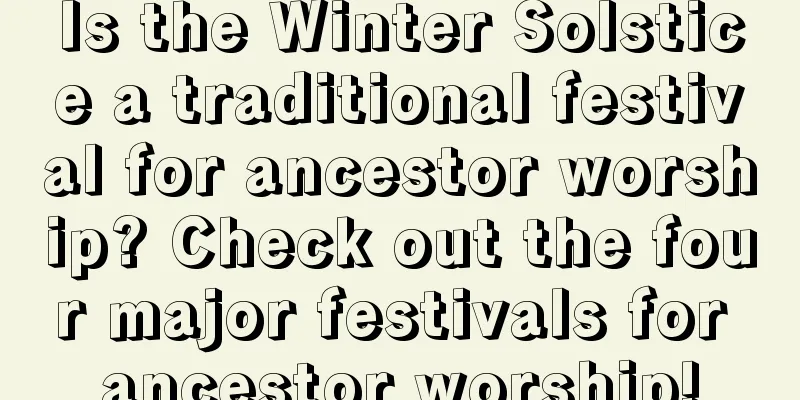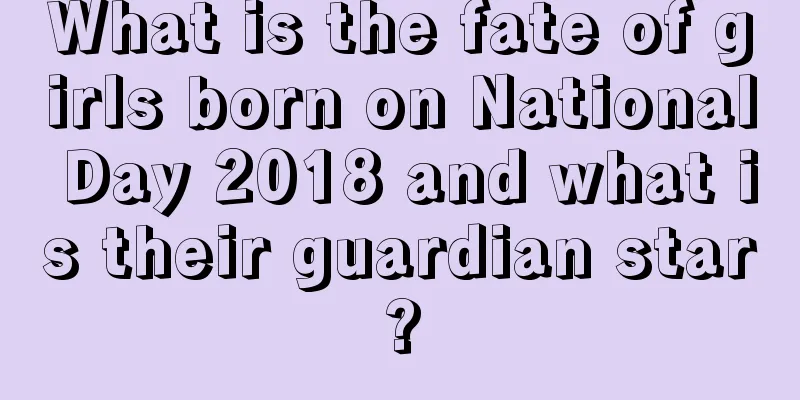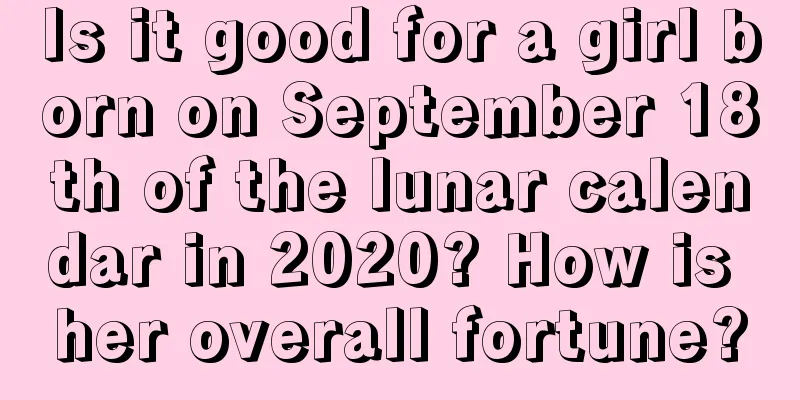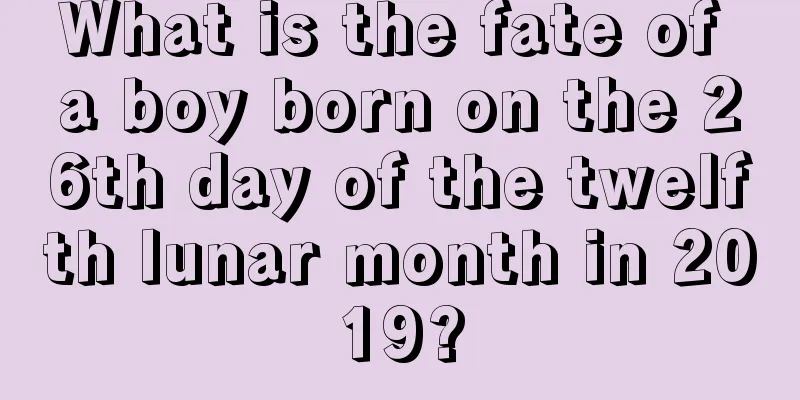Is the Winter Solstice a traditional festival for ancestor worship? Check out the four major festivals for ancestor worship!

The Winter Solstice is the 22nd solar term in the year and also one of the traditional festivals. This day is highly valued by people. Is the Winter Solstice a traditional festival for ancestor worship? Check out the four major festivals for ancestor worship! Shui Mo Xiansheng website has carefully compiled detailed information about the eleventh month of the lunar calendar in 2019. If you want to know about the auspiciousness and inauspiciousness of the eleventh month of the lunar calendar, please come to Shui Mo Xiansheng website!Is the Winter Solstice a traditional festival to worship ancestors?The Winter Solstice is one of the traditional festivals: the Second New Year, the Minor New Year, and the Festival for Ancestor Worship . The Winter Solstice has both natural and humanistic connotations. It is both a natural solar term and a traditional festival for ancestor worship.《2》The Winter Solstice is one of the eight festivals of the year. The Chinese nation has a tradition of worshiping ancestors on the Winter Solstice since ancient times to show filial piety and remember one's roots. Due to different customs in different places, the forms of ancestor worship are also different. Ancestor worship and sacrifices While offering sacrifices to their ancestors, some places also offer sacrifices to the gods of heaven and earth. The main offerings include three kinds of meat, three kinds of tea and five kinds of wine. The winter solstice is regarded as a major festival in winter. Importance of Winter Solstice There is a widely circulated saying among the people that "Winter Solstice is as important as New Year's Day". The Winter Solstice is also called "Second Year" or "Little New Year". One reason is that it indicates that the end of the year is approaching, and the other is that it indicates the importance of the Winter Solstice. When the Winter Solstice arrives, the New Year is just around the corner, so the ancients believed that the Winter Solstice was no less important than the New Year. In ancient times, people who lived away from home would return home to celebrate the winter festival at this time of year, the so-called "having a home to return to at the end of the year." Winter Solstice Worship The order of seniority in worshipping during the Winter Solstice is as follows: father, mother, eldest son, eldest daughter, second son, second daughter, and so on. After the worship is completed, the offerings are blessed by the ancestors and then everyone can eat them. Finally, of course, you must pay attention to fire safety and you can leave after all the incense and candles are lit. Query of the four major ancestor worship festivalsThe four major traditional Chinese festivals for ancestor worship: New Year's Eve, Qingming Festival, Double Ninth Festival, and Zhongyuan Festival (Chu, Qing, Jiu, Yu) -《1》Qingming Festival—— 》Also known as the Outing Festival, it is held at the turn of mid-spring and late spring, which is the 108th day after the winter solstice. It is a traditional Chinese festival and one of the most important festivals for worshipping ancestors. It is a day for worshipping ancestors and sweeping tombs. The traditional Qingming Festival of the Chinese nation began around the Zhou Dynasty and has a history of more than 2,500 years. 《2》Zhongyuan Festival—— 》It is commonly known as Ghost Festival, Giving to Orphans, and the Mid-Autumn Festival, and is called the Ullambana Festival in Buddhism. Along with New Year's Eve, Qingming Festival and Double Ninth Festival, it is China's traditional festival for ancestor worship, and is also a traditional cultural festival popular in countries in the Chinese character cultural circle. There is a custom of releasing river lanterns and burning paper ingots during the Ghost Festival. 《3》Double Ninth Festival—— It was formed as early as the Warring States Period. In the Tang Dynasty, the Double Ninth Festival was officially designated as a folk festival. According to the old custom, all relatives would climb high places together to "avoid disasters" on this day. To this day, in many places such as Tonglu in Zhejiang, Putian in Fujian, Taiwan, and Singapore, people still "prepare pigs and sheep to worship their ancestors" on September 9th, which is called the Autumn Sacrifice. 《4》New Year's Eve—— 》It is also known as New Year's Eve, New Year's Eve, New Year's Eve, and New Year's Eve. It is the last night of the twelfth month of the lunar calendar every year. "Chu" means to remove; "xi" refers to night. New Year’s Eve is a festival for bidding farewell to the old and welcoming the new, starting a new year and bringing renewal to everything. Along with Qingming Festival, Zhongyuan Festival and Double Ninth Festival, it is China's traditional festival for ancestor worship, and is also a traditional cultural festival popular in countries in the Chinese character cultural circle. |
<<: What is the fortune and lucky gods for those born at the hour of Yin on Thanksgiving Day 2019?
>>: Is Thanksgiving Day, November 28, 2019, a good time to get married? Thanksgiving Ceremony
Recommend
Is the 15th day of the 11th lunar month in 2019 an auspicious day? Can I burn incense and pray for blessings?
The real meaning of burning incense and worshiping...
Is March 22nd of the lunar calendar 2021 an auspicious day? Is it okay to open on the same day?
A lot of people open new businesses every day, but...
Is it good to offer sacrifices one day after the beginning of spring in 2021? What is the good and bad luck of the time on February 4, 2021?
Introduction: Generally, it is necessary to choose...
Is it a good idea to pick up a new car on September 17th of the lunar calendar in 2018?
There are good and bad days, and this happens rep...
Is it a good idea to pick up the car on August 5, 2017? Is it easy to drive the new car on the road?
August ushers in the golden autumn season. This i...
Is it good for a boy to be born on March 25th of the lunar calendar in 2022? What is his fortune?
People born in the third month of the lunar calend...
What should you not do on the second day of the first lunar month in 2019? Why do you go back to your parents' home on the second day of the first lunar month?
Introduction: The second day of the first lunar mo...
What are the do’s and don’ts for the 17th day of the sixth lunar month in 2020? Are there any taboos?
June is a hot month and the lotus flowers are in ...
Can I move on July 4, 2020? Lunar July moving auspicious day 2020
Introduction: It is necessary to choose an auspici...
What are the rules for what to wear when visiting graves during the Qingming Festival? What preparations should be made for tomb sweeping during Qingming Festival?
It rains heavily during the Qingming Festival, whi...
Is it suitable to sign a contract on August 26, 2019, the day after the autumnal equinox? Will there be more rain after the autumnal equinox?
Introduction: Generally, you need to choose an aus...
Can I move house in June of the lunar calendar in 2022? Check the auspicious days for moving house
The sixth month of the lunar calendar is the last ...
What is the lunar calendar for November 25th, 2021? Can I get engaged?
The eleventh month of the lunar calendar is also k...
Is November 13th of the lunar calendar in 2021 an auspicious day? Is it a good day to travel?
The eleventh month of the lunar calendar is the se...
Is September 25th of the lunar calendar 2021 a good day? Is this auspicious day for getting married?
The ninth month of the lunar calendar is the third...









